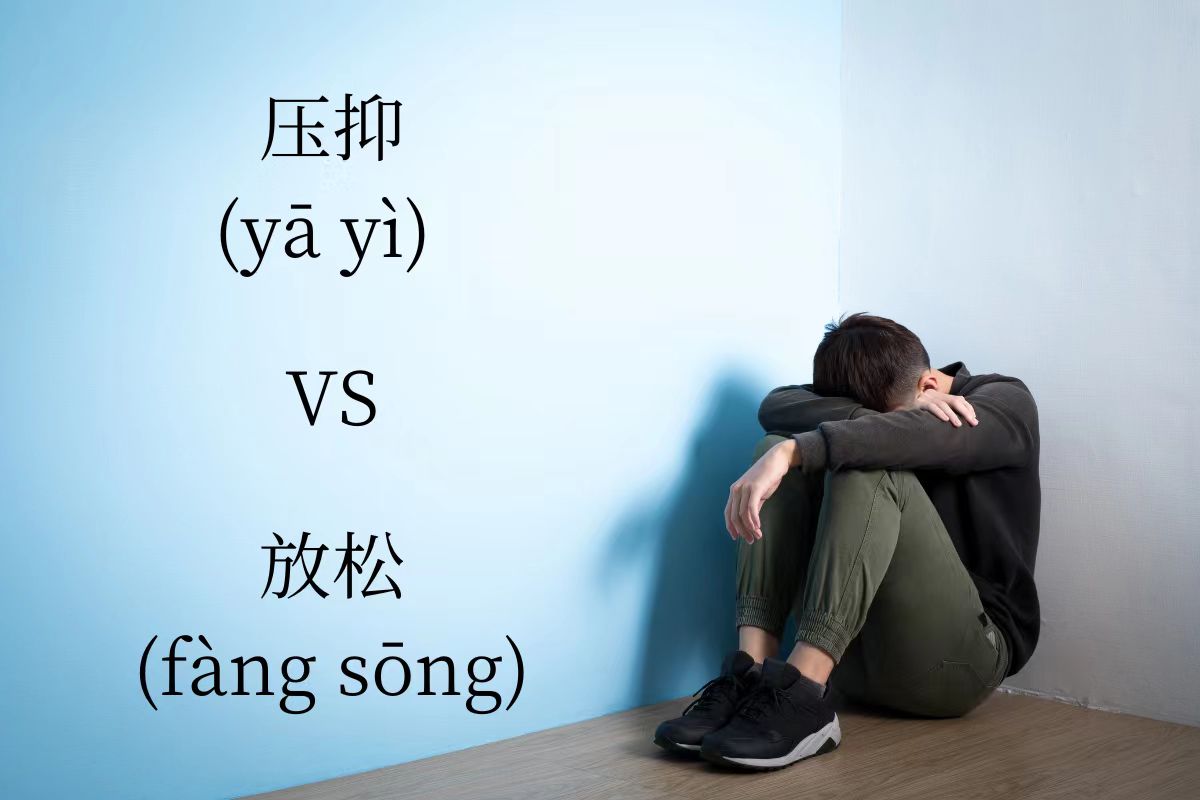HSK Words: 压抑 (yā yì) VS 放松 (fàng sōng)
In Chinese language learning, the HSK words 压抑 (yā yì) and 放松 (fàng sōng) represent contrasting concepts that are often confused due to their opposing meanings. Understanding the distinction between these two words is crucial to accurately convey ideas and emotions in Chinese.

压抑 (yā yì) typically refers to a feeling of being constrained or suppressed, often emotionally or mentally. It implies a sense of restraint or inhibition, where natural impulses or desires are held back or contained. This state of 压抑 (yā yì) can be caused by external pressures or internal conflicts, leading to a sense of unease or discomfort.
Examples:
- In a high-pressure work environment, he feels emotionally constrained and unable to unleash his creativity.
在高压的工作环境下,他感到心情压抑,无法释放自己的创造力。
zài gāo yā de gōng zuò huán jìng xià,tā gǎn dào xīn qíng yā yì,wú fǎ shì fàng zì jǐ de chuàng zào lì。 - She has been suppressing her emotions and is afraid to express her true feelings.
她一直压抑着自己的情感,不敢表达真实的感受。
tā yī zhí yā yì zhe zì jǐ de qíng gǎn , bù gǎn biǎo dá zhēn shí de gǎn shòu 。 - I was so depressed at that time that I would burst into tears at any time.
我那段时间太压抑了,以至于任何时候都可能突然哭出来。
wǒ nà duàn shí jiān tài yā yì le , yǐ zhì yú rèn hé shí hòu dōu kě néng tū rán kū chū lái 。
On the other hand, 放松 (fàng sōng) implies a state of relaxation or ease, both physically and mentally. It suggests a release from tension or anxiety, allowing for a sense of freedom and tranquility. 放松 (fàng sōng) is to let go of restraints and allow oneself to unwind, resulting in a refreshed and rejuvenated state.
Examples:
- On weekends, he likes to go for walks in the countryside to relax and unwind.
周末的时候,他喜欢去郊外散步,放松身心。
zhōu mò de shí hòu , tā xǐ huān qù jiāo wài sàn bù,fàng sōng shēn xīn。 - She decided to take a break and relax properly to alleviate work stress.
她决定请个假,好好放松一下,以缓解工作压力。
tā jué dìng qǐng gè jià , hǎo hǎo fàng sōng yī xià,yǐ huǎn jiě gōng zuò yā lì。 - Deep breathing exercises will help you relax.
深呼吸运动有助于放松自己。
shēn hū xī yùn dòng yǒu zhù yú fàng sōng zì jǐ 。
In summary, 压抑 (yā yì) and 放松 (fàng sōng) represent two opposing states in Chinese: one of constraint and suppression, and the other of relaxation and ease. Understanding the distinct meanings and appropriate usage of these words can enhance your Chinese language proficiency and communication skills.
Quiz: Please consider whether to use 压抑 (yā yì) or 放松 (fàng sōng) in the following sentences.
- 我听音乐_____心情。
wǒ tīng yīn yuè _____ xīn qíng。 - 哭出来比_____你的情绪要好得多。
kū chū lái bǐ _____ nǐ de qíng xù yào hǎo de duō 。 - 不要_____自己的情绪,否则会在某一天爆发出来。
bù yào _____ zì jǐ de qíng xù , fǒu zé huì zài mǒu yī tiān bào fā chū lái 。
Answers:
- 放松 (fàng sōng)
- 压抑 (yā yì)
- 压抑 (yā yì)